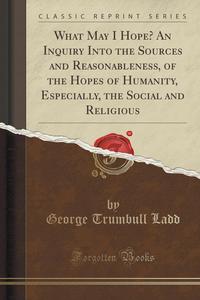Excerpt from What May I Hope? An Inquiry Into the Sources and Reasonableness, of the Hopes of Humanity, Especially, the Social and Religious
The psychology and philosophy of knowledge have excited the interest of the world"s best thinkers through many centuries of history. Especially did Aristotle, the greatest of teachers among the ancient Greeks, write several voluminous works dealing with the different main aspects of this subject. In his De Anima, or Psychology, be discussed the phenomena of sense-perception, including dreams; he also discoursed upon the functions of the Nous, or mind, both receptive and active even to the extent of having an immediate grasp upon the highest truths. His Treatise on Logic, or so-called Organon, analyzed the intellectual processes of conception, judgment, and the syllogism, with such skill and thoroughness that it was not until recent times that any considerable modifications of the formal laws of thought were considered necessary.
About the Publisher
Forgotten Books publishes hundreds of thousands of rare and classic books. Find more at www.forgottenbooks.com
This book is a reproduction of an important historical work. Forgotten Books uses state-of-the-art technology to digitally reconstruct the work, preserving the original format whilst repairing imperfections present in the aged copy. In rare cases, an imperfection in the original, such as a blemish or missing page, may be replicated in our edition. We do, however, repair the vast majority of imperfections successfully; any imperfections that remain are intentionally left to preserve the state of such historical works. Это и многое другое вы найдете в книге What May I Hope? An Inquiry Into the Sources and Reasonableness, of the Hopes of Humanity, Especially, the Social and Religious (Classic Reprint) (George Trumbull Ladd)
